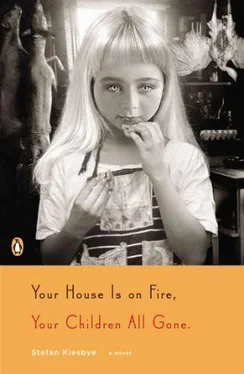“Shut up,” Alex growled. “My grandpa used to take baths in the Droste all winter long, and he’s still around.” He turned to Broder. “Okay, we’ve got fifty marks.”
The boy stripped to his underwear, then stood by the rim of the ice. Around us the air was filled with snow and darker than the ground, and it was very quiet, except for Broder sucking in the air and blowing his nose. The snow must have been a shower of a thousand needles.
“I can do it,” he said and looked once more at the pile of money. Then he jumped, feet first, pinching his nose. The water took him.
We soon found ourselves crouching at the hole, our hearts louder than the protesting ice. We were feverish, we suddenly knew that we’d have to explain later, and that no one would forgive us for what we’d done, and we knew in our hearts that Broder would never come up, had never stood a chance. And yet. And yet as long as we could hold our breaths with him, he might pull it off. He might. The fifty marks said so.
The Droste River was only three to four meters deep where we stood, and we had often touched the bottom on lazy summer days, but this was January; this was an eight-year-old boy. And yet.
We expected to hear knocking, and searched the ice. Was Broder caught under the thick sheet? Had Bernhard been right? Was it impossible to find the opening?
“He’s dead,” Bernhard finally said, his mouth twitching.
“He’s dead,” I said, having counted slowly to sixty. My four marks lay in the snow. What would I have given to never have offered them?
Bernhard didn’t stop crying when Broder’s head appeared in front of us. He cried louder, and we all shouted in rough voices and lifted the boy out of the water. He was red as if we’d boiled him. In his right hand he held the hatchet. “It was so dark,” Broder stammered. “So dark. I couldn’t see a thing down there, and when I came up, I didn’t know where I was. A moment longer and I would have swallowed water.” He went on like this, while we tried to wipe him dry with his shirt. “So dark I had to feel for the hatchet on the ground. And there were slimy things, and once I felt that something was grabbing my leg and pulling me farther down. It pulled and pulled and wouldn’t let go.” His whole body twitched and shivered, and words poured from him, in awe of being with us again, in awe of what he had just done and how he had shown us.
Holger took off his brown scarf and helped dry the boy, rubbing his face and hair.
“Wait,” Alex said. He took the wet hatchet and threw it back down in our fishing hole. “You did it once,” he said. “Fifty marks. It’s a lot of money for a bit of cold. Come on, Broder, it’s easy. Just once more.”
The boy turned to Alex and grinned, not sure whether or not it was a joke. I stared at Alex, stared at Broder. We held wet scarves and shirts in our hands and stared from one to the other. There didn’t seem to be a single sound left in this world.
Then Broder jumped.
We threw his shoes and clothes after him that night, along with the fifty marks. We made a solemn pact to keep quiet forever.
Bernhard didn’t keep his word though, and the Hoffmanns went to the police and refused to take the money Alex’s father offered them. All five of us were guilty, but the Hoffmanns went easy on the rest of us. They wanted Alex. It had been his idea. It had been his axe.
After dark Mr. Frick came to see my father, the Gendarm, and I could hear them talking heatedly. They kept the door to the living room closed for long hours. My dad wanted to help him, but in the end he had no say in the matter. The Hoffmanns insisted on their rights. His hands were tied; he had to think of his own son. At the end of March, Alex was sent away for three years and the rest of us wished we could have left Hemmersmoor too.
Three generations of the family had lived in the manor house by the time I was thirteen, but the old master no longer managed the place and had handed the reins over to his son. Bruno von Kamphoff was in his forties and looked more like his mother. He had nothing of his father’s harshness of features. His eyes were big, brown, and melancholy, his fingers and limbs pale and long. He played the piano as frequently as the old mistress. He was not well liked in the village because he was “weak.” He was “effeminate.” Be that as it may, he knew how to handle his vast staff comprising a cook, maids, several butlers, a chauffeur, and farmhands working the land. Finally, of course, they had my father, who came every day in his cranky old truck with only one wheel in front, a once innovative design that already in my early childhood had been an object of much ridicule. Bruno never paid my dad more than the old von Kamphoff had.
His wife had once been a famous singer in Hamburg, and the apothecary’s wife swore that she’d been a harlot in some St. Pauli revue before becoming mistress of the Big House. Karin von Kamphoff wasn’t beautiful but striking. Her features were clear-cut; she had a large nose, a large mouth, large blue eyes, and a high forehead. Her body was padded “in all the right places,” as the men of Hemmersmoor observed, and on Christmas Eve she still sang to guests while her husband accompanied her on the piano. “These days,” the apothecary’s wife said, “she doesn’t have to undress to get what she wants.”
Rumors abounded, as they did with every family who lived somewhat removed from our eyes. The basement was filled with war loot, one said; the basement was used for black masses, went another. Bastard children were popular, as was the black woman Johann von Kamphoff supposedly captured during the war and held hostage in his basement. The most enduring legend, however, was that of the real heir. The real heir, the customers in Frick’s Inn contended, was as real as the sun and stars, and many proclaimed to have seen him until about forty years ago, when he’d vanished in infancy. He’d been Johann’s younger brother, and because of a violent fight between Johann and his father had been made the heir of the manor. Yet he hadn’t been spotted since before the wars, and many a night it was speculated that Johann had everything to do with his disappearance. If he should ever return, Bruno would lose everything.
Bruno von Kamphoff’s children, Rutger and Sophie, were twenty and seventeen the summer I accompanied my father to the Big House. Their parents’ clashing physical attributes had endowed them with great beauty, and the villagers admired and despised them for it. Of course we hardly saw them in Hemmersmoor, since the von Kamphoffs had never attended our school. They were educated by private teachers from Hamburg and Bremen who lived in one wing of the Big House or another.
At my age habit and new discoveries were at war within me. I loved my father, loved following him around and listening to instructions on how and when to cut rosebushes, but I also wanted to know who my friend Anke was making out with, what the best ways were to bewitch a boy’s heart, and how to smoke without coughing.
I often visited Ilse Westerholt, the oldest daughter of our neighbors, and borrowed barrettes or dresses from her. I didn’t have any siblings—“How should we feed them?” my mother said—and Ilse braided my hair endlessly, washed and scrubbed my face until it hurt, and showed me how to pluck my eyebrows. I hoped to earn adoring looks or a whistle from the groups of older boys who hung around outside Frick’s Inn on their mopeds.
It was six years after Friedrich and his mother had died, and the last summer I went out to the von Kamphoffs. Many days I didn’t even get up at five to have coffee with dad and take my seat next to him in the truck. When I did go, I felt awkward standing next to my father and lending him a hand. I seemed too big, too energetic, too grown, and too pretty to still walk by his side.
Читать дальше












